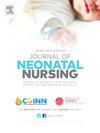Culturally competent nursing care as a promoter of parental empowerment in neonatal unit: A scoping review
Q2 Nursing
引用次数: 0
Abstract
Problem
In neonatal units, a significant number of newborns and their respective parents and families are hospitalized, each with culturally distinct practices and perspectives that require specialized knowledge. However, the literature lacks comprehensive evidence depicting culturally competent nursing care that concurrently promotes parental empowerment in the neonatal units.
Eligibility criteria
The review was conducted following the methodology recommended by the Joanna Briggs Institute and in accordance with the Preferred Reporting Items for Systematic Reviews - Scoping Reviews (PRISMA-ScR) guidelines. Searches were performed on MedLine, CINAHL, Psychology and Behavioral Science Collection, MedicLatina, Scopus, Web of Science, the Scientific Open Access Repository of Portugal (RCAAP), Mednar, and Google Scholar. Study eligibility criteria were defined based on the PCC mnemonic.
Sample
A total of 608 records were identified for title and abstract screening, with 30 selected for full-text review. Ten studies met the inclusion criteria.
Results
The studies, published between 2002 and 2023, focused on the following cultures: Lumbee, Chinese, Jewish, Ghanaian, Nigerian, Ugandan, Mexican, Taiwanese, Iranian, and Aboriginal. Culturally competent nursing care promoting parental empowerment is categorized into: the relationship between parents and healthcare professionals, the care process, alignment of needs with community resources, alignment of needs with healthcare, and receiving information and emotional support.
Conclusions
Culturally competent care, rooted in family-centered care, promotes parental empowerment, which can consequently translate into improved quality of nursing care.
Implications
Recommendations for clinical practice, education, and research are suggested, emphasizing the importance of identifying cultural determinants and needs perceived by parents with children admitted to neonatal care units, specific to each culture present in different countries.
文化主管护理作为一个促进父母授权在新生儿单位:范围审查
在新生儿病房,大量新生儿及其各自的父母和家庭住院,每个人都有不同文化的做法和观点,需要专门知识。然而,文献缺乏全面的证据,描绘文化主管护理,同时促进父母的权力在新生儿单位。入选标准本次评审采用Joanna Briggs研究所推荐的方法,并按照系统评审的首选报告项目-范围评审(PRISMA-ScR)指南进行。在MedLine、CINAHL、Psychology and Behavioral Science Collection、MedicLatina、Scopus、Web of Science、葡萄牙科学开放存取库(RCAAP)、Mednar和谷歌Scholar上进行检索。根据PCC助记符定义研究资格标准。共有608条记录被确定用于标题和摘要筛选,其中30条被选中进行全文审查。10项研究符合纳入标准。这些研究发表于2002年至2023年之间,主要关注以下文化:蓝比人、中国人、犹太人、加纳人、尼日利亚人、乌干达人、墨西哥人、台湾人、伊朗人和原住民。促进父母赋权的文化主管护理分为:父母与医疗保健专业人员之间的关系、护理过程、需求与社区资源的一致、需求与医疗保健的一致以及接受信息和情感支持。结论文化胜任型护理根植于以家庭为中心的护理,促进父母赋权,从而转化为护理质量的提高。本文对临床实践、教育和研究提出了建议,强调了识别新生儿监护病房收治儿童的父母感知到的文化决定因素和需求的重要性,并针对不同国家存在的每种文化提出了具体建议。
本文章由计算机程序翻译,如有差异,请以英文原文为准。
求助全文
约1分钟内获得全文
求助全文
来源期刊

Journal of Neonatal Nursing
Nursing-Pediatrics
CiteScore
2.00
自引率
0.00%
发文量
143
期刊介绍:
Aims & Scope: This is the practical, bimonthly, research-based journal for all professionals concerned with the care of neonates and their families, both in hospital and the community. It aims to support the development of the essential practice, management, education and health promotion skills required by these professionals. The JNN will provide a forum for the exchange of ideas and information between the range of professionals working in this field; promote cooperation between these professionals; facilitate partnership care with families; provide information and informed opinion; promote innovation and change in the care of neonates and their families; and provide an education resource for this important rapidly developing field.
 求助内容:
求助内容: 应助结果提醒方式:
应助结果提醒方式:


